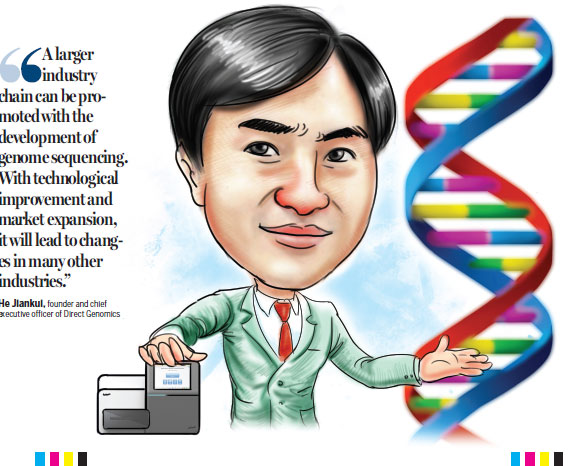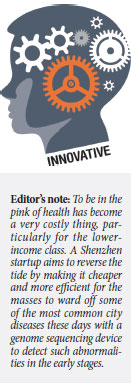Guaranteeing a clean bill of health for generations
Updated: 2016-07-21 08:23
By Zhou Mo in Shenzhen(HK Edition)
|
|||||||
Genome sequencing can detect people's abnormal genes and help them thwart possible diseases or deal with them at an early stage. But, unfortunately, not all patients on the Chinese mainland are able to enjoy such a technology.
Taking a test normally costs $1,000, which is far beyond the means of many low and middle-income patients. And, only a few mainland hospitals own sequencers to offer the service directly. The price for the instrument is high and the operating procedure is complex. The test is now mainly carried out by genomics services providers.
Then, the GenoCare analyzer appears - a single-molecule genome sequencer designed specifically for clinical use. Launched in October last year by Shenzhen-based startup Direct Genomics, the device has made it possible for all people to take the test at an affordable price and with high efficiency.

"Second-generation sequencers have lowered the sequencing cost to $1,000, enabling the technology to be widely applied in research and development," says He Jiankui, founder and chief executive officer of Direct Genomics.
"With the third-generation GenoCare, we aim to reduce the cost further to $100 after five years, making sequencing test something that's affordable to everyone."
According to He, who is also an associate professor of biology at the South University of Science and Technology of China, the most important advancement of GenoCare from its predecessors is that it enables a wider application of sequencing.
Second-generation sequencers are mainly used for cancer detection. The new instrument, however, extends the application fields to diabetes, Parkinson's disease, cardiovascular diseases and so forth, He explains.
Besides, the efficiency of sequencing has been enhanced to a large extent, from up to a month to two days, he adds. "People who take the blood test today will be able to get a report the next day."
So far, only two companies worldwide have developed third-generation sequencers - Pacific Biosciences in the US and Oxford Nanopore Technologies in the UK. The advent of GenoCare indicates that the four-year-old Chinese company is becoming one of the world's leaders in the genomic sequencing area.
At present, mainstream sequencers on the market are second-generation instruments, dominated by US company Illumina, which claims a 71-percent global market share, according to a market survey by US online news organization Genomeweb.
A report by US-based market research firm BCC Research says the global genome sequencing market had expanded from $8 million in 2007 to $4.5 billion in 2013. The market is tipped to grow by more than 20 percent annually over the next few years, hitting $11.7 billion by 2018.
Cao Junbo, chief analyst at iResearch Consulting Group, is positive about the prospects for the genome sequencing market.
"A larger industry chain can be promoted with the development of genome sequencing. With technological improvement and market expansion, it will lead to changes in many other industries," he predicts.
Despite promising market potential, He was met with skepticism in the early stages of his entrepreneurship. Industry insiders doubted whether he had the capability to make a major breakthrough in the field, and investors were not interested in putting money into a company from which they could not get short-term investment return. Within half a year, He had been rejected by 30 venture capital companies.

"From research and development to final sales, roughly 200 million yuan ($30 million) is needed for the whole process. However, at one time, we even had a negative asset account. The company nearly went bankrupt. Fortunately, an angel investor helped us weather the difficulty. When we made achievements, more investors came to us and we managed to pull through," recalls the 32-year-old entrepreneur.
Currently, Direct Genomics has more than 50 employees and six scientific advisors, including Stephen Quake - He's postdoctoral supervisor when he was at Stanford University and the person who developed the single-molecule sequencing method.
"Quake is not only a scientist, but also an entrepreneur who owns a number of companies. Due to his influence, I thought it was important to commercialize those scientific achievements, and that prompted me to set up my own company," says He.
GenoCare is expected to enter the trial use stage by the end of this year, and a number of organizations and universities, including those from Hong Kong, Shenzhen, Shanghai and the US, have placed orders for the instruments.
He aims to penetrate the US market first before promoting the device intensively on the domestic market. The US, he says, has higher recognition for advanced sequencers.
He also plans to set up a research and development center at Silicon Valley to lure more talents to join the company.
"Our country lacks talents in this area. We hope to absorb talents globally to propel our cause."
sally@chinadailyhk.com
(HK Edition 07/21/2016 page8)